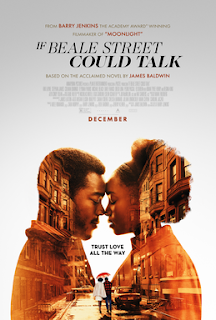If Beale Street Could Talk
If Beale Street Could Talk, written and directed by Barry Jenkins and based on a novel by James Baldwin, is a lovely film, pitch perfect in tone and a much more accurate version of black lives in America than Green Book. Also unlike that film, it eschews easy answers.
Fonny and Tish (Stephan James and KiKi Layne) have known each other all their lives. They are in love, and Jenkins makes us feel that love. I can't think of a more romantic film I've seen recently. Watching them gaze into each other's eyes and just taking a walk on a rainy Greenwich Village street, a red umbrella the only splash of color, is dreamy.
But the film is more than a romance, it's an unfortunately prescient story about injustice for black men. James, who is a mild-mannered sculptor, is accused of raping a woman. She has identified him in a line-up, but under pressure from the D.A. The only real witness is a racist cop. James is locked up and learns that Layne is pregnant.
The film runs on two tracks: the present, in which James is in prison and Layne and her mother (Regina King) work with a lawyer (Finn Witrock) to get him out, and flashbacks to their relationship. He is looking for an apartment for the two of them, but is frequently turned away with obvious discrimination. When they find a Jewish man (Dave Franco) who is willing to rent them a loft space regardless of their race, James and Layne celebrate like the fourth of July.
The film has many memorable scenes. Early in the film Layne tells her parents she is pregnant. They roll with it, but when they invite James' family over, there's trouble. His father is overjoyed, but his mother, a devoutly religious woman (Aunjunee Ellis), curses the baby in Layne's womb. This all plays out like a kitchen-sink drama, and crackles with life. When Ellis says her daughters would never do such a thing, Layne's older sister says, "Yeah, because nobody fucks them."
I have only one problem with the film--James and Layne's characters are a bit too idealized. It seems like the old days, when characters played by Sidney Poitier had to be above reproach. Neither one of them has any noticeable faults. Also, I couldn't tell you anything about Tish. What does she like, what are her hopes and dreams, what does she think about in quiet moments? She's pretty much a blank slate.
The performances are all terrific. King just won the Golden Globe for Best Supporting Actress, and deservedly so, even if I would go with Amy Adams for Vice. I also liked Colman Domingo as Layne's father. Jenkins, if he doesn't round out the characters completely, knows what to do with a camera.
There is so much going on with black directors these days that it would be a shame if Green Book won the Best Picture Oscar. I liked that film, but in no way is it a representation of any black experience. It's more like a sit-com. If Beale Street Could Talk deserves the plaudits.
Fonny and Tish (Stephan James and KiKi Layne) have known each other all their lives. They are in love, and Jenkins makes us feel that love. I can't think of a more romantic film I've seen recently. Watching them gaze into each other's eyes and just taking a walk on a rainy Greenwich Village street, a red umbrella the only splash of color, is dreamy.
But the film is more than a romance, it's an unfortunately prescient story about injustice for black men. James, who is a mild-mannered sculptor, is accused of raping a woman. She has identified him in a line-up, but under pressure from the D.A. The only real witness is a racist cop. James is locked up and learns that Layne is pregnant.
The film runs on two tracks: the present, in which James is in prison and Layne and her mother (Regina King) work with a lawyer (Finn Witrock) to get him out, and flashbacks to their relationship. He is looking for an apartment for the two of them, but is frequently turned away with obvious discrimination. When they find a Jewish man (Dave Franco) who is willing to rent them a loft space regardless of their race, James and Layne celebrate like the fourth of July.
The film has many memorable scenes. Early in the film Layne tells her parents she is pregnant. They roll with it, but when they invite James' family over, there's trouble. His father is overjoyed, but his mother, a devoutly religious woman (Aunjunee Ellis), curses the baby in Layne's womb. This all plays out like a kitchen-sink drama, and crackles with life. When Ellis says her daughters would never do such a thing, Layne's older sister says, "Yeah, because nobody fucks them."
I have only one problem with the film--James and Layne's characters are a bit too idealized. It seems like the old days, when characters played by Sidney Poitier had to be above reproach. Neither one of them has any noticeable faults. Also, I couldn't tell you anything about Tish. What does she like, what are her hopes and dreams, what does she think about in quiet moments? She's pretty much a blank slate.
The performances are all terrific. King just won the Golden Globe for Best Supporting Actress, and deservedly so, even if I would go with Amy Adams for Vice. I also liked Colman Domingo as Layne's father. Jenkins, if he doesn't round out the characters completely, knows what to do with a camera.
There is so much going on with black directors these days that it would be a shame if Green Book won the Best Picture Oscar. I liked that film, but in no way is it a representation of any black experience. It's more like a sit-com. If Beale Street Could Talk deserves the plaudits.



Comments
Post a Comment